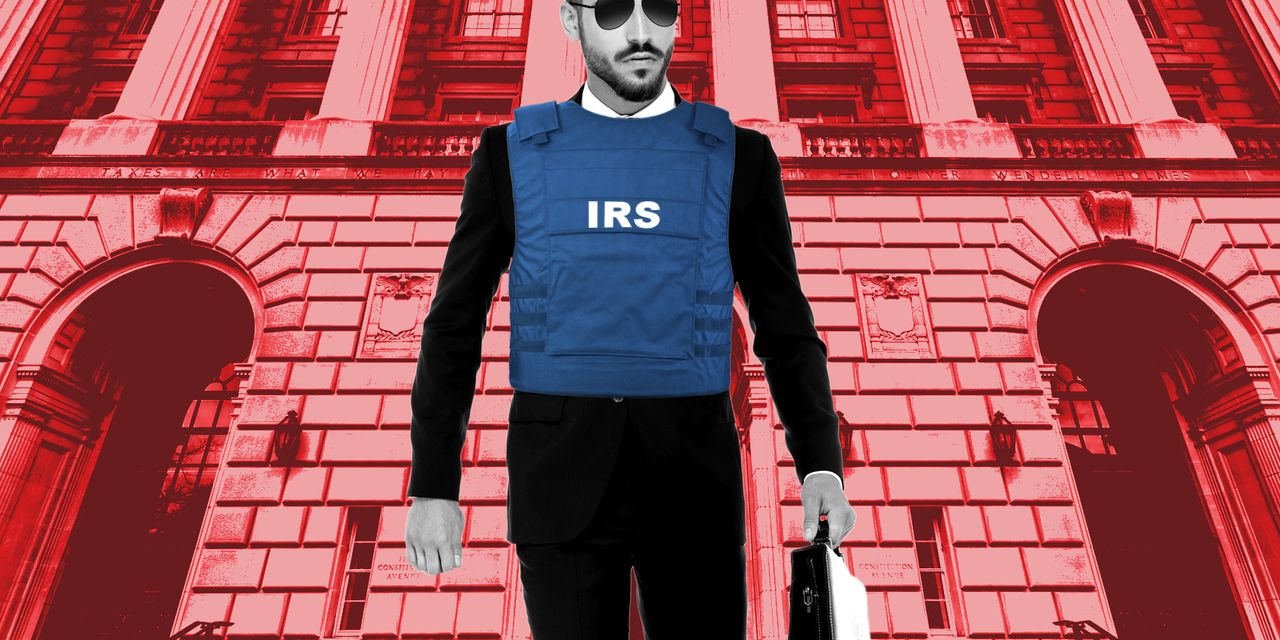The Internal Revenue Service’s operations are catching heat as it looks increasingly likely the tax agency is bound for an $80 billion budget boost under the Democrats’ proposed spending plan — and now there’s attention on IRS workers who actually pack heat.
It started as criticism from some Republican leaders that the tax collecting agency would bring on 87,000 new employees to “target regular, everyday Americans” with the $80 billion earmarked for the IRS in the Democrats’ Inflation Reduction Act, which looks poised to become law. That’s a “misleading” claim, according to the Associated Press.
Now there’s an online stir over job postings for IRS special agents who have to carry guns as part of their work with the IRS’ Criminal Investigation division.
Though the job is really about sniffing out income and accounting irregularities to build legal cases, one of the potential duties is “conduct[ing] or participat[ing] in surveillance, armed escorts, dignitary protection, undercover operations, execution of search and arrest warrants, seizures, etc,” the job listing states.
There are 300 vacancies for the role, which pays between $50,704 – $89,636 annually, according to the listing.
Though the job listing drew new attention this week, requiring some IRS special agents to potentially use deadly force is nothing new, an IRS criminal investigation spokeswoman confirmed.
“The job description is consistent with previous special agent announcements for the same position and consistent with announcements from other federal law enforcement agencies,” the spokeswoman said, noting the IRS criminal investigation division is the federal government’s sixth largest law enforcement agency.
Here’s some context on the special agent listing and the broader debate over more funding for the IRS.
As a starting point, the estimate of the IRS bringing on 87,000 new employees comes from the Treasury Department last year, the AP noted. It would be a multi-year hiring plan and it would encompass extra auditors plus an array of other jobs as other IRS workers left or retired, the AP added.
IRS ranks have been shrinking over the years. The IRS’ annual data book shows in the last fiscal year, it had almost 79,000 full-time workers, nearly a 13% decrease from fiscal year 2012.
Data show the criminal investigation division is a sliver of the IRS’s overall workforce. The agency’s criminal investigation division includes approximately 3,000 employees, with 2,100 being sworn agents, the spokeswoman noted.
As the agency’s workforce has decreased, so did the IRS’ audit rate among taxpayers of all income levels. Government data shows the decrease is especially sharp for higher earners.
More than half of the $80 billion in supplemental funding in the Inflation Reduction Act would be earmarked for more tax compliance enforcement. Biden administration officials, including Treasury Secretary Janet Yellen and IRS Commissioner Charles Rettig, have pledged that the extra enforcement will not be directed at small businesses and households making less than $400,000.
“Contrary to the misinformation from opponents of this legislation, small business or households earning $400,000 per year or less will not see an increase in the chances that they are audited,” Yellen said.
Three-quarters of voters say they are not personally worried about getting audited if the IRS gets its funding influx, according to a Morning Consult/Politico poll Wednesday. More than half (56%) said they were not worried about more audits generally.
If the Inflation Reduction Act is passed by the U.S. House of Representatives in a Friday vote and signed by President Joe Biden, the IRS later has to explain its spending plan to lawmakers, tax experts said — and some worry there’s still too few resources being devoted to helping regular taxpayers with questions.
The $80 billion over a decade would be on top of annual budget appropriations for the agency. The debate over the funding is heated, with some observers saying the IRS needs every cent and others saying it needs no extra money.
For instance, Mark Everson, former IRS commissioner during the George W. Bush administration from 2003 to 2007, says the agency needs more money, but not at this magnitude. Extra, inflation-adjusted appropriations around 3% to 5% are a better bet for manageable growth, said Everson, vice-chairman of alliantgroup, a specialty tax services provider.
“The IRS needs to proceed extremely carefully as it ramps up,” he said, later adding, “they’ve got to get the right people.” That holds true just as much within the criminal investigation division, he noted.
The division itself is “a relatively small part of the agency, but it’s very important, both in terms of the role it plays for criminal tax problems and in support of other violations of law, including terrorism and corporate fraud.”
IRS criminal division officials have to be involved in law enforcement efforts because “financial information is frequently an important element of federal criminal investigations. They play an essential role,” Everson said.
The scandals and criminal cases surrounding WorldCom and Enron were two instances when the division played an instrumental role, Everson said. More recently, the IRS’s criminal division was involved in the 2013 takedown of the “Silk Road,” an underground website for drugs and illegal services fueled by Bitcoin
BTCUSD,
payments.
During fiscal year 2021, the IRS completed almost 2,800 criminal investigations, with most resulting in referrals to prosecution. That included more than 1,000 cases related to tax crimes like evasion, 979 financial crime cases including money laundering and 735 drug-related financial crimes.
The long view shows the drain on the criminal investigation division as well. In fiscal year 2011, the division completed nearly 4,700 investigations, according to IRS data.
